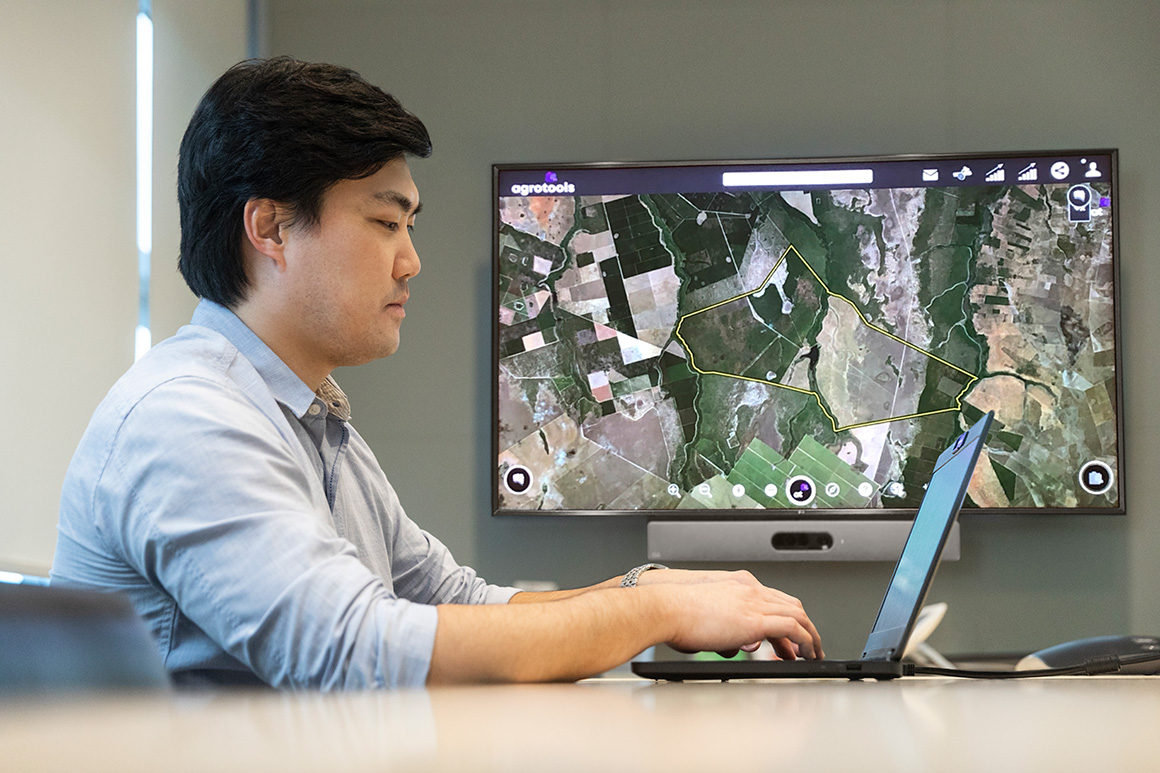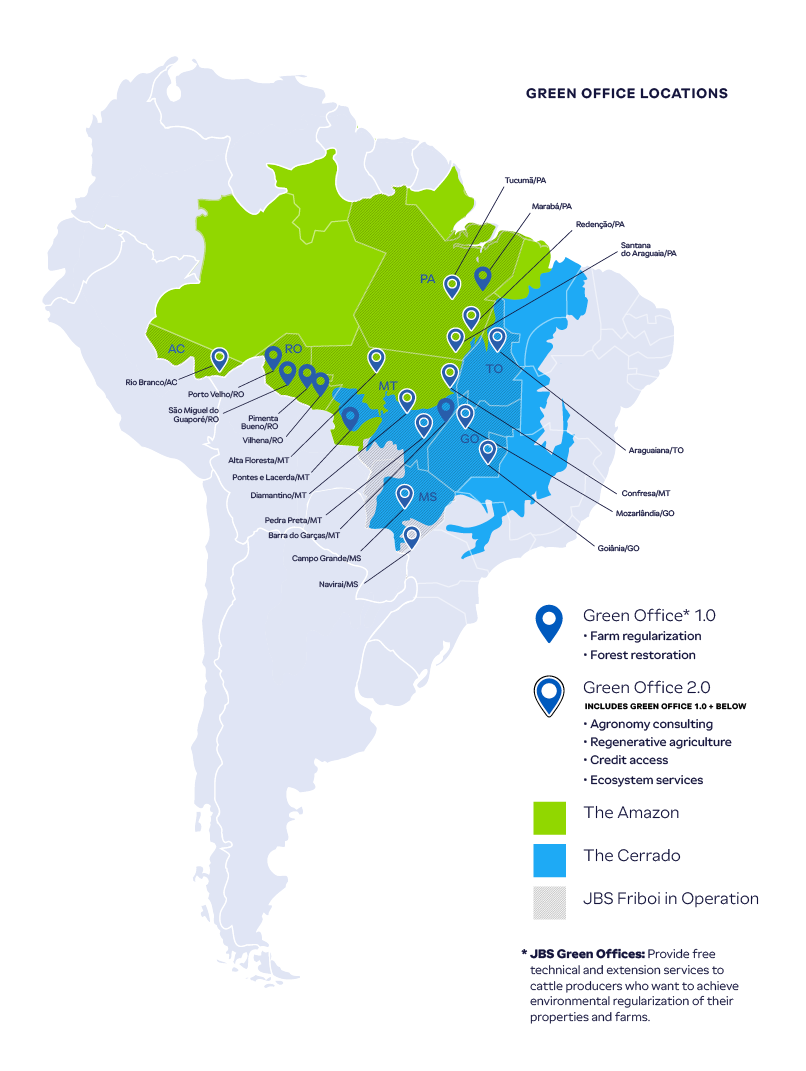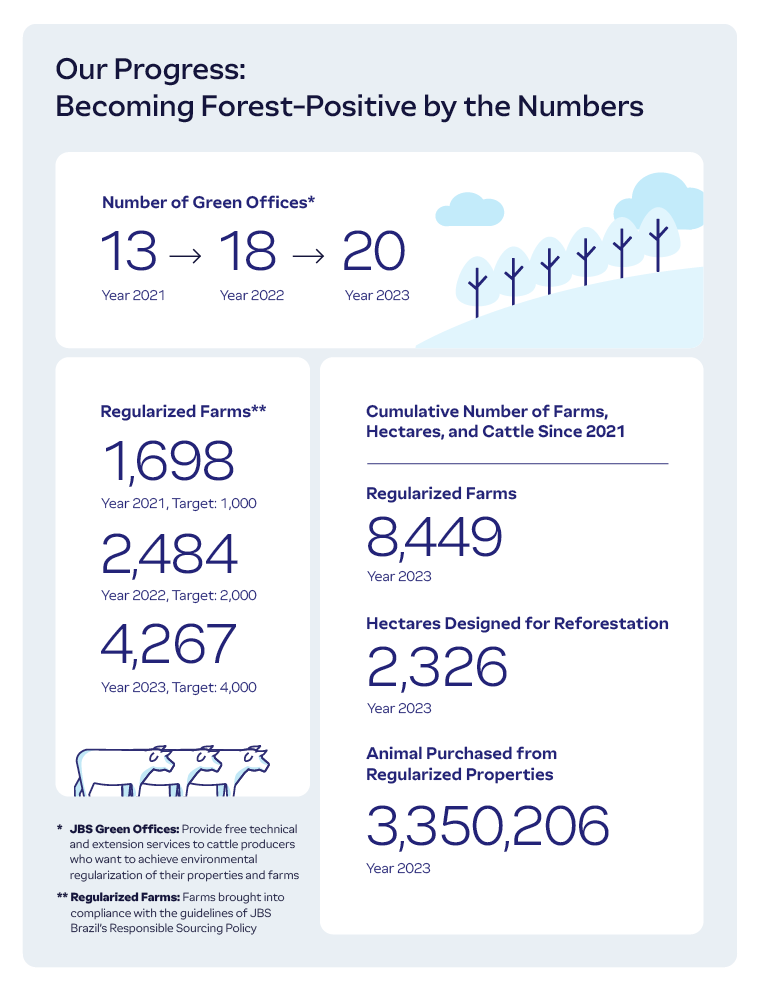Our Environment

Responsible Sourcing
Commodity Supply Chain Monitoring and Management
We recognize our role as a value-chain leader starts with making sure our raw materials are sourced responsibly. In doing so, we can influence our entire value chain, from supplier adoption of best practices to the final quality of our products.

We work to establish relationships with our suppliers that are based on partnership and encourage the implementation of initiatives that improve their governance and practices. Guided by our Global Code of Conduct for Business Associates, we maintain an open dialogue with our suppliers on issues involving respect for the environment, human rights, and national and local labor laws. Through this code, we strive to ensure that our suppliers are compliant with applicable laws and regulations.
Our Regional Approaches:
Australia:
All cattle and small stock that are consigned for sale are required to have a National Vendor Declaration (NVD), a document verifying Australian meat and livestock food-safety, as well as the product’s origin....
Australia:
- All cattle and small stock that are consigned for sale are required to have a National Vendor Declaration (NVD), a document verifying Australian meat and livestock food-safety, as well as the product’s origin. In signing the NVD, the producer declares compliance with the Livestock Producer Assurance (LPA), an independently audited on-farm food-safety certification program. The NVD contains information relevant to the husbandry of livestock consigned for harvest. In addition, before cattle leave their farm of birth, they must be tagged with an approved National Livestock Identification System (NLIS) individualized Radio Frequency Identification (RFID) tag. This allows each animal’s movements to be recorded in a national database and provides the assurance of livestock trace-back to the property of birth and trace-forward from the property of birth. Sheep are required to have an ear tag visually identifying their unique property of origin number.
- Hogs for sale in Australia are branded with a unique farm identification number. The PigPass national tracking system provides real time information on the movements of all pigs in Australia including which farm they came from. A PigPass National Vendor Declaration (PigPass NVD) form must be completed when pigs are moved between properties. The Australian Pork Industry Quality Assurance Program (APIQ) audits and accredits farms and maintains the data base for PigPass. This allows animal movements to be recorded in a national database and provides the assurance of livestock trace-back to the property of birth and trace-forward from the property of birth. All JBS Australia hogs are sourced from Australia Pork Industry Quality Assurance Program (APIQ) accredited farms, maintaining industry best-practice animal welfare standards.
- Huon fish suppliers are required to hold Global GAP Integrated Farm Assurance certification. The Global GAP standard includes social, environmental and animal welfare requirements with which these suppliers must comply. Supplier compliance is verified through annual internal audits conducted by Huon as well as annual external audits conducted by third-party organizations required to maintain the Global GAP certification.
Brazil:
Our Responsible Purchasing Policy of JBS Friboi has defined socio-environmental criteria for supplier selection and exclusion since 2009. The policy covers such topics as...
Brazil:
- Our Responsible Purchasing Policy of JBS Friboi has defined socio-environmental criteria for supplier selection and exclusion since 2009. The policy covers such topics as compliance with the country’s laws and regulations and industry best practices.
- In our beef supply chain, we source cattle from farms that are compliant with stringent social and environmental requirements in terms of location, labor and environmental legislation. Learn more about our cattle sourcing practices in Brazil below.
- In our poultry and pork supply chains, we guarantee that purchases of soybean meal from the Amazon biome are from suppliers who are signatories to the Soy Moratorium in the Amazon, ensuring that our products are in no way linked to or contribute to deforestation in the biome.
- Seara has implemented a Sustainable Grain and Oil Sourcing Policy to ensure the preservation of native vegetation and responsible production in the company’s Brazilian grain and oil supply chains. The policy applies to all employees and business partners involved with Seara's grain and oil products across the Brazilian territory.
- Seara manages contracts for more than 9,000 contract farms to quickly identify and, if necessary, isolate farms where any quality or safety issues are identified. The system also monitors chicken welfare at each stage of the production process.
- At Swift, all sourcing activity follows guidelines and procedures outlined in JBS’ South America Sourcing Policy and Contracting Policy. Swift largely purchases raw materials for its products directly from JBS, in accordance with the Group Sourcing Policy, Sustainable Cattle Sourcing Policy and Animal Welfare Policy. All suppliers are screened and undergo due diligence on compliance to these policies.
- JBS Brazil has also been a signatory of the National Pact to Eradicate Slave Labor since 2007 and a member of the Institute for the National Pact to Eradicate Slave Labor (InPACTO) since 2014.
Canada:
All cattle suppliers are required to sign an affidavit indicating their compliance with governmental regulations, certification of Beef Quality Assurance (BQA) or an equivalent animal-welfare certification program.
Europe:
The European Union (EU) has enacted laws prohibiting the sale of certain products, and products fed with or derived from commodities grown or produced on lands that have been deforested.
Europe:
- The European Union (EU) has enacted laws prohibiting the sale of certain products, and products fed with or derived from commodities grown or produced on lands that have been deforested. A similar law is expected in the U.K. Our Pilgrim’s Europe business has committed to ensure deforestation and conversion free soy (soya) across its targeted supply chains by 2025. To achieve this, we have implemented the following strategies:
- The Pilgrim’s Europe Chicken business has implemented a Responsible Sourcing Policy, which outlines that raw materials must be sourced in accordance with the following requirements:
- Raw materials will be sourced only from bona fide sources and in compliance with existing local land and forest use laws.
- No deforestation of primary forest or areas of high conservation value.
- No burning to clear land for new developments or to re-plant existing developments.
- Compliance with the criteria set out in Group’s Supplier Requirements Manual.
- The Pilgrim’s Europe Pork business has conducted a series of trials to support the reformulation of its pigs’ diets and source practical alternatives to soy where possible. EU and UK grown alternative proteins are used across all of company diet formulations as part of extensive R&D programs.
- We are members of the UK Round Table for Sustainable Soya and the Round Table on Responsible Soy (RTRS), signatories of the UK Soy Manifesto and Cerrado Manifesto Statement, supporters of the Amazon Soy Moratorium, and founding partners of the Soy Transparency Coalition. We also work closely with non-governmental organizations (NGOs) and advisory groups to educate and inform policy makers across the globe.
- Each of our European businesses also complies with the provisions of the UK's Modern Slavery Act 2015 and the duty it places on businesses to publicly disclose the steps they are taking to tackle forced labor and human trafficking. We regularly review and improve our practices through effective due diligence and risk assessment, raising awareness of modern slavery and collaborating to protect the most vulnerable groups of people.
- Pilgrim's Europe Chicken Modern Slavery Statement
- Pilgrim’s Europe Pork Modern Slavery Statement
- Pilgrim’s Europe Prepared Foods Modern Slavery Statement
- All poultry farms in Europe are Red Tractor approved, and our Pilgrim's Europe Chicken farms meet or exceed the Red Tractor or equivalent welfare standards. Farms are audited by independent, approved certification bodies.
- For purchased meats, the Pilgrim's Europe Chicken business operates under a Policy for Supply Chain Assurance, ensuring that meat products come from approved suppliers who at a minimum meet the Red Tractor or another equivalent standard.
- Our Pilgrim's Europe Orléans business purchases beef for further processing sourced only from approved suppliers that are audited annually for food safety and animal welfare. They also developed contracting initiatives with French beef farmers associations to ensure available supply. In a declining French cattle market, this provides farmers an alternative to an otherwise volatile and uncertain market. This program has the following attributes:
- Ensures Pilgrim's Europe Beef Orléans supplies of available animals
- Provides a set price, independent of market fluctuations, to improve economic efficiency and income security for all, including engaged farmers
- Requires farmers have a market and a medium- to long-term production plan
- Enhances production of cattle from farms that meet the Charter of Good Breeding Practices
Beef Orléans also encourages its suppliers to purchase cattle from farms involved in Charte des Bonnes Pratiques d’élevage (Good Farming Practices) agreement. The Good Farming Practices, established by the National Livestock Confederation (CNE), is the approved industry standard. Meat from the Netherlands and Ireland also meet requirements set out by the Good Farming Practices. This contributes to making sure 100% of our contracted farm partners are audited for animal welfare and environmental performance.
- Our Pilgrim’s Europe Pork business' hogs are raised in accordance with the Royal Society for Prevention of Cruelty to Animals (RSPCA), the Red Tractor or the Quality Meat Scotland (QMS) standards. Certification and third-party audits according to these standards are required to sell hogs to Pilgrim’s UK production facilities.
- All Pilgrim’s Europe lamb producers are Farm Assured and raise lambs on farms that are independently audited by Farm Assurance Assessors. Our lamb producer partners also complete a Responsible Efficient Production Assessment biannually. This assessment evaluates the farm’s production, health, welfare and environmental standards.
Mexico:
We audit all Pilgrim’s Mexico supplier farms in compliance with Mexican government standards, including Ministry of Agriculture and Rural Development (SADER), Mexico-United States Commission for the the...
Mexico:
We audit all Pilgrim’s Mexico supplier farms in compliance with Mexican government standards, including Ministry of Agriculture and Rural Development (SADER), Mexico-United States Commission for the Prevention of Diseases and Other Exotic Animal Diseases (CPA), Secretariat of Agriculture, Livestock, Rural Development, Fisheries and Food (SAGARPA), Ministry of the Environment and Natural Resources (SEMARNAT) and State Civil Protection.
United States:
All cattle suppliers are required to sign an affidavit indicating their compliance with governmental regulations, certification of Beef Quality Assurance (BQA) or an equivalent animal-welfare certification program...
United States:
- All cattle suppliers are required to sign an affidavit indicating their compliance with governmental regulations, certification of Beef Quality Assurance (BQA) or an equivalent animal-welfare certification program.
- We encourage our feedyard partners to enter the precompetitive National Cattlemen’s Beef Association (NCBA) Feedyard Assessment Database. Enrollment is voluntary and demonstrates a producer’s commitment to environmental stewardship, animal care and quality.
- We require all family farm partners supplying hogs to our facilities to be certified in accordance with the Pork Quality Assurance Plus (PQA+) Program. We conduct third party audits of randomly selected partners according to the PAACO-certified Common Swine Industry Audit. We also conduct internal animal welfare audits on a specific subset of our suppliers.
- We audit a subset of the family farm partners who supply our chickens according to the Animal Welfare Program requirements, conducted by internal Professional Animal Auditor Certification Organizations (PAACO) certified team members and external, third-party auditors.
Case Studies:
Eliminating Agriculture-Related Deforestation
At JBS, we believe that people and planet should not be at odds. For us, becoming people and planet positive means that agricultural food systems are inextricably linked to the protection and restoration of our shared natural resources. That’s why JBS is undertaking a comprehensive approach toward addressing the drivers of deforestation while also positively supporting livestock producers and the tens of thousands of farm families we depend upon to produce food.
In Brazil, our efforts to mobilize support for sustainable food production are underpinned by robust action and financial investments across multiple states that make up the largest Brazilian biomes, specifically the Amazon and Cerrado regions. The deforestation challenge in Brazil and in agricultural commodity supply chains around the world is larger than any one company — or even one sector — can solve on its own. As one of the world’s leading food and agricultural companies with the scope and scale to influence change, JBS is partnering across agriculture’s full supply chain to address the environmental impacts of food production and help our suppliers adapt to a changing climate.
We believe that strong standards and enforcement, coupled with positive incentives and producer support, can lead to better supply chain integrity and producer viability, without compromising food security through increased costs to consumers. Economic vitality, food production capacity, and quality of life for communities must be in balance with nature. The following lays out the JBS approach and investments toward eliminating deforestation in our Brazilian cattle supply chain.
Our Commitment: Collective Action for Forest Protection
JBS sits in a pivotal position in the food value chain – interacting upstream with farmers, ranchers, grain originators, and input suppliers, and downstream with distributors, retailers, restaurants, and consumers. While not the only agricultural commodity company in Brazil, JBS is an industry leader that can help influence the complex agricultural supply chain. As such, JBS has made two key public commitments toward becoming forest-positive with the opportunity to deliver change at scale through our value chain partners.
Specifically, as a responsible business, JBS is committed to:
Delivering zero illegal deforestation in all Brazilian biomes by the end of 2025 for direct and tier 1 indirect1,2 cattle suppliers.
(Note: JBS Friboi reports this goal is met in 2023 for its direct cattle suppliers and is now addressing illegal deforestation risks within its network of tier 1 indirect cattle suppliers)Advancing the Tropical Forest Alliance−aligned “Roadmap to 1.5°C” implementation plan for the Cattle Sector in the Amazon and Cerrado biomes
The Amazon: 2023 target date for no-deforestation for direct suppliers and 2025 for indirect suppliers (legal and illegal, PRODES 2008)
The Cerrado and other biomes: 2025 target date for no illegal deforestation (PRODES 2020) for direct and indirect suppliers
Our Principles: A Roadmap Toward Eliminating Deforestation
The following principles guide the JBS forest-positive action plan, inclusive of cattle in Brazil:
End illegal deforestation in all biomes by the end of 2025 for both direct suppliers and tier 1 indirect suppliers (Direct suppliers are currently compliant)
Achieve complete transparency and monitoring for direct and tier 1 indirect suppliers
Engage the supply chain and cross-sector stakeholders to create common standards and scale ambitions and improvements
Influence drivers of deforestation for both direct and indirect suppliers
Focus on priority biomes at greatest risk
Provide economic opportunities for farmers and communities
Our Action Plan: Mobilizing the Agricultural Value Chain Toward Zero Deforestation
JBS has a five-pronged approach to combating potential deforestation in our supply chain that is centered on:
Deforestation zero-tolerance sourcing policy
Supply chain monitoring and enforcement
Technical assistance and extension services for producers
Accelerated sectoral changes through multi-stakeholder engagement and collaboration
Promotion sustainable development
The following are programmatic highlights to represent clear, compelling, and collaborative impact, and are an integral part of our total commitment.
- Our Zero-Tolerance, Zero-Deforestation Sourcing Policy
According to numerous studies by NGOs and universities including the National Wildlife Federation, The Nature Conservancy, and University of Wisconsin Madison, nearly 93% of illegal deforestation in the Amazon biome is in the first two levels of cattle suppliers to meat processing facilities (breeding and rearing).
JBS’s Responsible Raw Material Procurement Policy prohibits the purchase of livestock from farms involved in deforestation, forced labor, invasion of indigenous territories, or embargoed by Brazilian environmental authorities. In addition, all livestock suppliers in the Amazon who sell to JBS must adhere to the “Protocol for Monitoring Cattle Suppliers in the Amazon” (also known as the Beef on Track Protocol), developed by the non-governmental organization Imaflora and the Brazilian Federal Prosecutor’s Office (MPF). Beef on Track establishes the processes and tools for monitoring, auditing, and reporting for a deforestation-free beef supply chain.
- Supply Chain Monitoring and Enforcement
JBS has developed a cattle supplier monitoring system that leverages public and government databases, satellite imagery, and geo–referenced data to verify compliance with socio-environmental standards. Our monitoring system covers a significant number of direct livestock suppliers and has blocked almost 13,000 potential supplier farms in Brazil since implementation over a decade ago.
Due to privacy laws in Brazil, there is a lack of information available regarding upstream transactions with indirect cattle suppliers. To overcome that challenge and complement our monitoring system for direct suppliers, JBS has also built and deployed the Transparent Livestock Farming Platform , a digital platform to increase the visibility further up the cattle supply chain to the tens of thousands of farms that sell cattle to our direct suppliers. This free, confidential, open-source, online platform uses blockchain technology to extend monitoring of our direct suppliers to their suppliers — producers with whom the company does not have a direct business relationship, but who are a critical part of the supply chain. In 2023, more than 62% of cattle processed by JBS were enrolled in the platform, with the goal being to achieve 100 percent participation by 2025.
Beginning in 2026, all direct suppliers who wish to do business with JBS must be on the platform.
- Technical Assistance and Extension Services
Sourcing policies, monitoring, and compliance systems help to prevent noncompliant cattle suppliers from entering the JBS supply chain, however, at the same time it is important to have drivers or economic incentives that deter forest clearing.
JBS is investing significant resources to address this challenge. We have established a network of 20 Green Offices since 2021 to provide free technical support and extension services to farmers who want to improve environmental performance, productivity, and sustainable practices. The JBS Green Offices include teams of specialists and certified consultants who provide free technical support to producers to help them bring their farms into compliance. To date, JBS Green Offices have helped 8,449 farms that produce about 3.4 million head of cattle come into compliance with Brazil’s Forest Code requirements.
Based on the success of the initiative, the company launched JBS Green Offices 2.0 in November 2023. In addition to continuing to provide support and extension services, select locations now also offer additional tools for producers to apply sustainable practices on farm – such as regenerative agriculture and agronomy techniques – in order to increase the profitability of smallholder farmers. Seven out of the 20 Green Offices are already offering these additional services.
Furthermore, JBS provides free agronomic and business planning services to farmers through our Fazenda Nota 10 (“A+ Farm”) Program to help enhance the productivity, profitability, and sustainability of their operations. Utilizing a proprietary software platform, JBS specialists are able to demonstrate both opportunities for on-farm improvement and performance against other producers in the region. Certified consultants then help develop strategies to empower producers to sustainably intensify production and reduce the economic incentives to illegally clear additional forest. With more than 463 farms currently enrolled, this is the largest group of cattle farmers ever engaged in an initiative of this kind in Brazil.

- Multi-Stakeholder Engagement and Collaboration
Our significant presence in Brazil and daily interactions with producers in the country give us firsthand experience with supply chains vulnerable to potential deforestation events. However, JBS is only one participant in the supply chain. That’s why we actively participate in multiple global forums, including the United Nations Climate Change Conference of the Parties (COP), the World Economic Forum, and the tropical Forest Alliance–supported Agriculture Sector Roadmap to 1.5°C, to work collectively to find solutions to the causes of deforestation that include beef, alongside other stakeholders.
- Promoting Sustainable Development
The JBS Fund for the Amazon is a Brazilian organization dedicated to financing initiatives and projects whose aim is the sustainable development of the Amazon Biome, encouraging the conservation and sustainable use of the forest, improvements in the quality of life of the population residing there and development by using technology and applied science.
This work is underpinned by forest conservation and restoration, socioeconomic development of communities, and scientific and technological development. Projects approved through the JBS Fund for the Amazon include: Sustainable cocoa corridor, Mãos Indígenas, Floresta em Pé (Indigenous Hands, Standing Forests), Bioplástico da Amazônia, FUTURE Endowment Fund for rural education, Fair and Sustainable Fishing Project, and Geoflora – Forest Automation and Carbon Specialization.

